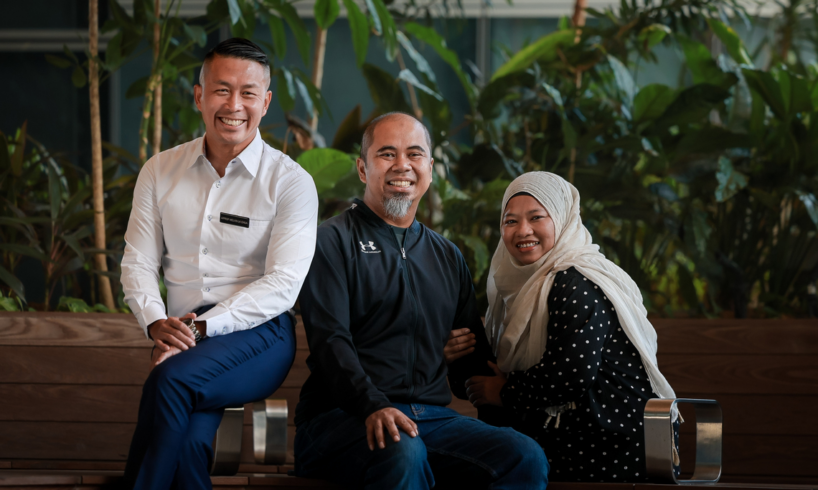
SINGAPORE – Mr Mohamed Farhain Mohamed Pawsie did not worry when he began having nosebleeds in November 2024.
He was told by a family doctor that the bleeding could be related to a fever he had. The 41-year-old safety manager also noted that he had previously experienced nosebleeds during times of stress and exhaustion.
When the nosebleeds occurred almost every other day, Mr Farhain became concerned.
In February, he was admitted to Sengkang General Hospital (SKH), where a biopsy showed he had Stage 3 nasopharyngeal cancer (NPC), or nose cancer.
The disease occurs when cancer cells develop from the tissues of the nasopharynx – the upper part of the throat behind the nose – causing symptoms such as nosebleeds, a painless lump on the neck and hearing loss.
It is one of the more common cancers in Singapore, affecting about 300 new patients each year.
While in Singapore NPC is most prevalent among Chinese men – with Minister of State Baey Yam Keng and Bukit Panjang MP Liang Eng Hwa
among those reported to have the disease
in recent years – it is also found among those of other ethnicities, with Malays making up the second-most affected group.
About 80 per cent of NPC patients here are Chinese, while Malays account for some 70 per cent of non-Chinese patients, according to a 2015 study by the NUS Yong Loo Lin School of Medicine.
The diagnosis for Mr Farhain was a particularly devastating one due to his family’s circumstances at the time: His late maternal uncle also had NPC, and his wife Nurislamiyah Ithsnen, who was heavily pregnant with their fourth child, had lost her mother to pancreatic cancer less than a year earlier.
Ms Nurislamiyah had also recently left her job as a pre-school principal in order to focus on taking care of their children, leaving Mr Farhain as the family’s sole breadwinner.
“When I first found out (about the cancer) I was actually very devastated, but (my wife) was there with me, so I tried to tell myself it’s going to be okay,” he said.
The attitude of Associate Professor Melvin Chua, Mr Farhain’s doctor at the National Cancer Centre Singapore (NCCS), where he had been referred from SKH, assured the family.
Mr Farhain said Prof Chua – who leads the head, neck and thoracic department at the NCCS radiation oncology division – had asked only that he comply with the doctor’s instructions.
“From the first time I met him, he told me, ‘I do not need anything else from you except for compliance. I’ll make sure you get well,’” said Mr Farhain, noting the term “compliance” resonated with him as a safety professional.
He began cancer treatment in March, with his first chemotherapy session occurring just one day before his wife gave birth.
Despite feeling fatigued from his treatment, Mr Farhain was with Ms Nurislamiyah in the hospital when their fourth child was born.
“He was worried about me giving birth,” she recalled. “He was in the corner, shivering and all, and he was just holding it all in, just for me.”
Mr Farhain underwent nine sessions of chemotherapy, as well as 35 sessions of proton therapy at NCCS.
Proton therapy is an advanced form of radiation therapy that uses energy from positively charged subatomic particles, or protons, allowing for the more precise targeting of cancer cells.
As Mr Farhain experienced fatigue and other side effects such as nausea, vomiting and a loss of appetite during his treatment, he was worried the impact on his job.
His employers were supportive, telling him “as long as you’re able to continue your treatment, you do it”, he recalled.
After six months of treatment, scans showed that Mr Farhain had no traces of cancer left.
However, it was not yet the end for him.
Mr Farhain was enrolled in a clinical trial after he persistently tested positive for
Epstein-Barr virus
DNA, a common virus which is a biomarker for nose cancer.
Detectable levels of the virus’ DNA after induction chemotherapy are associated with a higher risk of recurrence.
As many as 60 per cent of those with advanced NPC face the risk of relapse within two years, said Prof Chua, noting this points to the need for improved treatments.
“We know that the risk of his relapse is very high,” Prof Chua said of the decision to offer the trial to Mr Farhain.
The trial – which is being conducted at NCCS and Tan Tock Seng Hospital – has recruited 18 patients thus far, with the aim of eventually recruiting 69 NPC patients here.
In the trial, patients receive immunotherapy together with a combination of two oral chemotherapy drugs, tislelizmab and metronomic capecitabine.
Early results from the trial so far are promising, said Prof Chua.
To date, Mr Farhain has undergone two cycles of treatment under the trial, with 15 to go. The side effects of this treatment include numbness in the arms and legs, as well as dry skin and mouth.
Mr Farhain said he is hopeful that he will remain cancer-free, and credits his siblings and his wife’s siblings for helping his family with errands such as buying groceries while he was undergoing treatment.
Above all, he said he was grateful to his wife, whom he calls a “pillar of strength”.
“I didn’t express my concerns, but she was always there to calm me, especially during the days when I had really bad side effects,” he said.





